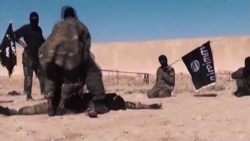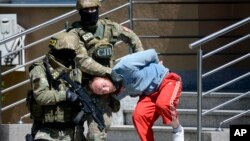Europe has been hard hit by Islamist attacks in France and Belgium, but there is also concern about radicalization on the continent itself. Among hotspots where young people have been found to gravitate towards extremism are majority Muslim nations in the Western Balkans.
Many paths lead people to Islamic radicalization. And while factors vary from country to country and from person to person, some commonalities can be found in the Western Balkan countries, such as Albania, Bosnia, Kosovo and Macedonia.
Factors ranging from vulnerable institutions and lack of opportunities to outside money and influence have been found among the underlying causes of radicalization in the region.
Adrian Shtuni, an expert on the phenomenon of radicalization in the Western Balkans, says the high number of fighters from that region going to Syria and Iraq is concerning.
“There are a lot of individuals that travel or are radicalized by their own peers. So they are radicalized by their own friends, their siblings, by their brothers and so on and so forth,” Shtuni says.
Since 2011, approximately 1,000 fighters from the Western Balkans have joined Islamist militant groups.
Radicalization can also stem from not focusing on economic and social development, says USAID’s Assistant Administrator for Europe and Eurasia, Thomas Melia. And for some communities, he points to another factor.
“Some international influences have pushed people in the wrong direction, radicalizing them and pushing them to more extreme views of Islam. We have seen that in several countries, in Albania and in Kosovo in particular, and in parts of Bosnia,” Melia says.
Saudi money
The New York Times reported recently that Saudi money and influence in Kosovo have transformed a once-tolerant Muslim society into "a font of Islamic extremism and a pipeline for jihadists" by spreading Wahhabism, a conservative Islamic strain dominant in Saudi Arabia.
Kosovo and other countries have undertaken initiatives to fight the tide of radical Islam, but Shtuni says that the region's fragile societies are still vulnerable.
“Let’s face it. In the Western Balkans the conditions in general, socio-economic or political, are not ideal. So yes, they do create an environment that is conducive to radicalization,” Shtuni says.
Seeking solutions
USAID's Melia says that efforts to change that environment should include better economic performance, more opportunities, and a sense that the government is not pursuing corrupt practices and is advancing society as a whole.
“That’s consistent with our larger development agenda, and it’s also increasingly important at this moment,” Melia says.
The issue has been complicated by Europe's migrant crisis. The Balkan route is one of the main paths to Western Europe, and the European Union, strained by the wave of people fleeing wars, now has fewer resources to deal with the Balkans' other problems.






